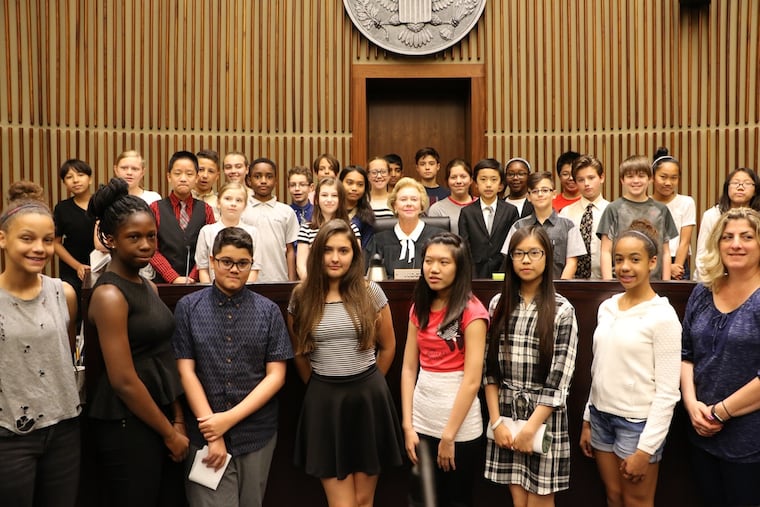Judge Marjorie Rendell: Civics education is failing | Opinion
How many of us are versed, let alone well-versed, in the way the government works?

I attended a conference several years ago at which retired Supreme Court Justice David Souter told a story of a Russian lawyer who visited the Supreme Court. The lawyer asked Souter what he thought was the most important opinion of the modern Supreme Court. He replied, as many of us would, that it was Brown v. Board of Education.
Souter could tell that his answer disappointed the lawyer, so he asked which case the lawyer would have chosen. The lawyer cited the Nixon tapes decision, in which the Supreme Court ordered President Nixon to turn over tapes of conversations he had secretly recorded. The Russian lawyer remarked that, in his country, a court could never tell the head of state what to do.
Souter said that, upon hearing this, he had “an epiphany”: We don’t teach our children civics, or how special our system really is.
At that moment, I, too, had an epiphany. I resolved to spend my judicial career — and my bully pulpit as first lady of Pennsylvania — trying to educate our children about ways in which the framers crafted a form of government that has been the envy of the world and, indeed, has been emulated by many nations over the years.
In these days of political turmoil, partisanship, and general distrust of elected officials, we tend to lose sight of the elegant way the framers crafted our form of government with three separate branches, each with distinct roles, designed to balance power. How many of us are versed, let alone well-versed, in the way the government works?
The framers believed democracy requires an informed citizenry. Thomas Jefferson observed that “wherever the people are well-informed they can be trusted with their own government.” Sadly, civics is not taught comprehensively in our schools. Basic knowledge that is crucial to the preservation of our democracy has been shoved aside in favor of subjects on the state-mandated standardized test. While Pennsylvania recently passed a law requiring schools to test students’ civics knowledge at least once in middle or high school — a step in the right direction — students do not have to pass the test, and it is unclear how effectively the curricula will imbue an understanding of our government, rights, and responsibilities.
That is why Ed Rendell and I founded the Rendell Center for Civics and Civic Engagement. The center provides basic civics knowledge in elementary grades through a We the Civics Kids curriculum, our annual Citizenship Challenge essay contest for 4th and 5th graders, and literature-based mock trials. We are encouraged by the talented teachers who use our resources.
But, as a nation, we still have a long way to go. Civics literacy is at an all-time low, and too many citizens shrug off their responsibilities to participate in our government. Recent surveys from the Annenberg Public Policy Center revealed that over a third of respondents cannot name any of the five rights protected by the First Amendment, and only two in five can name all three branches of government. We are celebrating the 100th anniversary of the passage of the XIX amendment, yet only 53% of Pennsylvania women voted in the 2018 election. We must do better.
I encourage you to visit the Rendell Center website to see the work we are doing not just at the elementary school level, but also to educate the broader citizenry about the functions of our government. On Oct. 26, we will host a symposium at the University of Pennsylvania Law School focused on the judicial branch. We will feature thought-leaders discussing the court system and celebrating the constitutional framework that allows our federal judges to be independent — free to make tough rulings, as in the Nixon tapes case, without fear of retribution.
The framers wrote the Constitution to provide federal judges with life tenure and bar Congress and the president from reducing judges’ compensation — a reaction to King George III’s habit of docking judges pay when they didn’t do his bidding.
The symposium is a timely opportunity to engage in important discussion about the judicial role. The day will be capped off with remarks on the future of judicial independence by retired Supreme Court Justice Anthony Kennedy.
Please visit our website for more information. And please encourage your children and grandchildren’s teachers to find a way to put civics back in their classrooms. The Rendell Center is here to help.
Marjorie Rendell is Senior Circuit Judge of the U.S. Court of Appeals for the Third Circuit and a former first lady of Pennsylvania. www.rendellcenter.org